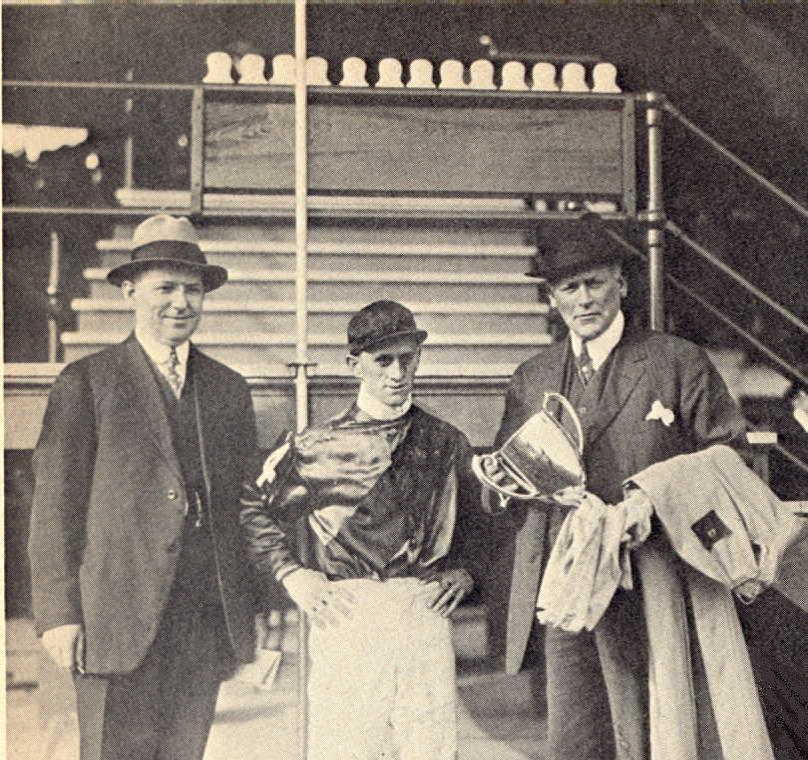Roscoe Goose was born and raised in Jeffertown, Kentucky. Roscoe was a jockey and horse trainer. He was one of the first ten men named into the Kentucky Hall of Fame. Roscoe is buried at Cave Hill Cemetary in Louisville, Kentucky.




Roscoe Goose was born and raised in Jeffersontown, Kentucky on 21 January 1891. Roscoe was a jockey, horse trainer, thoroughbred owner, and mentor/trainer of many famous jockeys (e.g. Charles Kurtsinger, Eddie Arcaro, Eugene James, Gilbert Elston, and others). He was one of the first ten men named into the Kentucky Hall of Fame. National Jockeys Hall of Fame in 1968. Roscoe is buried at Cave Hill Cemetery in Louisville, Kentucky.
His 1913 win of the Kentucky Derby set several new records, it was a new track record for that distance, it was the first time that a Louisville native "local boy" won the Derby, it had the largest crowd that year for attendance up to that point, and this Derby was the first to have BOTH a jockey and horse transported in just for the specific race all the way from New York. It set a track speed record 2:04 4/5 for 1 1/4 mile that stood until 1914. He holds the record at Churchill Downs in Louisville, Kentucky for having the highest odds (100 to 1) to have ever won the Kentucky Derby.
RESOLUTION
WHEREAS Roscoe Goose gained lasting fame by riding Donerail to win the Kentucky Derby of 1913 and to set an all-time record payoff of $184.90, and ...WHEREAS Mr. Goose graduated from the ranks of the riders to become a highly-respected trainer and owner of Thoroughbreds, and
WHEREAS Mr. Goose, while acting as a trainer and owner, took special interest in young boys wishing to learn the riding profession, even taking them into his home and clothing them and feeding them, and produced such notable riders as Charles Kurtsinger and Eugene James, who rode winners of the Kentucky Derby, and ... Gilbert Elston,
WHEREAS Mr. Goose has for more than 20 years served as an unofficial host to visiting turfwriters covering the Kentucky Derby, has given unsparingly of his time to provide information and help of all kinds to these writers, especially the new and uninitiated, and in all these years has shown himself to be a thorough gentleman and an example of all that's good in racing: be it
RESOLVED, That the National Turfwriters Association recommend to the National Jockeys Hall of Fame, the early election to that honored group of Mr. Roscoe Goose.
(Passed unanimously by the National Turfwriters Association in annual meeting at Churchill Downs, Wednesday, May 1, 1968).
Roscoe rode his first meet at Churchill in the spring of 1908, and his last in the spring of 1917. After retiring from riding in 1918, Roscoe became a successful trainer. In 1939 and 1940, he won stakes races with the horses: Kings Blue, Lightspur and Blue Delight. He also was active in helping up and coming jockeys, one of which was Charley Kurtsinger who rode 1937 Triple Crown winner War Admiral.

William Goose (Ganz)


Goose Creek, Louisville, Kentucky (stream)


Little Goose Creek, Louisville, Kentucky (stream)


Goose Creek (subdivision & shopping center), Louisville, Kentucky

Goose Creek Post Office, Louisville, Kentucky

Roscoe Goose got his surname, so family history and legend have it, from an ancestor who migrated to America from Germany in 1701. Many years later, William Ganz, a grandson of the emigrant, served with distinction in the American Revolutionary forces, being personally commissioned a captain by General George Washington.
On being mustered out after the war, Ganz told a fellow Pennsylvanian: "I am an American but I have a German name. What does 'Ganz' mean in American?"
Actually, the German word for "goose" is Gans. As a noun, Ganz is defined by Cassell's Dictionary as a "pig of iron" and as an adjective, it deals with the concept of entirety. But the two words sound almost alike in German, and Ganz's puckish friend made a delightful choice when he laughed and said, "In American it means 'goose.' Do you want to be a Goose?"
Ganz then and there announced that henceforth his name was William Goose (Ganz). Several years later he moved westward and settled in the area now known as Jeffersontown, [Kentucky].
In 1862 a descendant of William Goose, Sgt. Rufus Goose, joined the Union Army and also fought with distinction.
Names being what they are, William Ganz, the original Goose, probably had chosen wisely, despite the laughter of his friend. At least one is left to speculate whether the quaint, easily remembered name "Roscoe Goose" didn't have more impact on the course of events that impelled him toward fame and fortune than the name "Roscoe Ganz" might have had.
Be that as it may, Rufus Goose married in 1876 and the couple had five sons. Roscoe, later to be "The Golden Goose," was one of them.
The growing boys gradually followed their father into the fields and as naturally, picked up chores. Luther and Bill were fairly big. Tommie was not so big. Roscoe and Carl were unusually small.
Rufus looked at Roscoe and Carl one morning as they wrestled with a young goat, pushing her, much against her will, off the back porch. The goat finally gave up, jumped off and went running into the orchard. The youngsters looked up triumphantly.
"You two have the muscles of a mule, but you sure don't put on much height or weight." he said. "Aren't you ever going to grow up?" They both became jockeys...
Written by Earl Ruby, The Golden Goose, 1974.

Carl Seay Goose (Ganz)-b. 1893-d. 15 October 1915